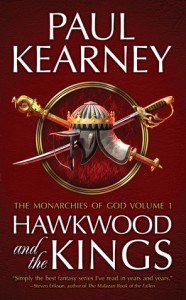 I actually read Paul Kearney’s Hawkwood and the Kings back in June, but for some reason, even though I loved it, I didn’t end up writing a full review. The review is actually for the omnibus of the first and second books in his Monarchies of God series and for a good reason. The end of the first, Hawkwood’s Voyage, has something along the lines of a cliffhanger, and while it’s not a “the main character has just been mortally wounded and now you have to wait X amount of time for the next book”, it still stands to reason that the books should have been published as one. I like to think of it in similar terms to Hyperion from Dan Simmons in that, from what I’ve heard (I haven’t read it yet), there is some sort of killer cliffhanger that people were likely to have been very upset having to wait the year or so it took for Simmons to release the sequel, but not quite as drastic.
I actually read Paul Kearney’s Hawkwood and the Kings back in June, but for some reason, even though I loved it, I didn’t end up writing a full review. The review is actually for the omnibus of the first and second books in his Monarchies of God series and for a good reason. The end of the first, Hawkwood’s Voyage, has something along the lines of a cliffhanger, and while it’s not a “the main character has just been mortally wounded and now you have to wait X amount of time for the next book”, it still stands to reason that the books should have been published as one. I like to think of it in similar terms to Hyperion from Dan Simmons in that, from what I’ve heard (I haven’t read it yet), there is some sort of killer cliffhanger that people were likely to have been very upset having to wait the year or so it took for Simmons to release the sequel, but not quite as drastic.
First and foremost, Hawkwood and the Kings is a definitive fantastical parallel to the Western Schism of the Christian church as well as the quest for the New World and the fall of Constantinople. There’s no beating around the bush about that – it’s a story of religious and cultural strife between the Ramusians (Christians) and the Merduks (Muslims). Even the map is a very thinly veiled Europe. The fact that the plot and world are so derivative do nothing to affect the ability of Kearney to tell a compelling story.
The books sets a grim tone with the fall of the holy city of Aekir to the Merduk horde. The crumbling and burning city is described vividly and we are introduced to my favorite character of the series, Corfe. Corfe is a solider who has had everything ripped from his hands. His wife is believed dead in the fall of Aekir, his friends dead, his home burned. His arc is something of a cross between a tale of redemption and one of listing along to wherever his feet take him because he has been so numbed by his loss.
Alongside Corfe, we have the mariner Richard Hawkwood, who is essentially coaxed into captaining a settling journey to the lands to the west, believed to be uninhabited – but are they?
King Abeleyn of Hebrion is the typical young king, and that’s why I liked him. Kearney crafts Abeleyn into a person with whom the more you read about the more you empathize. The Ramusian church, after the fall of Aekir, conducts a series of chauvinistic purges of all who are not Ramusians and members of the Five Kingdoms as well as Dweomer-folk, or magic-users, in Abeleyn’s kingdom without his consent, and his story revolves around strife with the Pontiff (Pope) and internal conflict in his kingdom. This, specifically, is what compels me to read more and more about religious strife in fiction. The bigoted and prejudiced views of medieval religious fanatics, if done well, provide great storylines. Kearney also supplies a few other characters as protagonists, from all sides of the conflict, but to a lesser extent than the aforementioned three.
As I said, Corfe was probably my favorite character, but Hawkwood’s journey to the New World was the one I was most eager to follow. I previously had a personal rule where I would not read two or more books in a series consecutively so as to preserve the story in my mind and keep me thinking that there’s still more waiting for me. Yeah, well that rule was broken for the only time this year in order to read the second half of Hawkwood and the Kings, The Heretic Kings. It’s something of a flintlock fantasy, but instead of muskets we have the more rudimentary arquebuses, and Kearney does the line-fire very well.
If you’re not opposed to the fact that Kearney’s world is a very thinly veiled carbon-copy of ours in the 15th century, I highly, highly recommend this series.
Grab Hawkwood and the Kings from:
Amazon (US)

I’ve probably asked this before, but I don’t remember. Have you read his Macht series? I’ve read and liked the first two books, but then the ending of the second one sort of depressed me so I’m waiting a while for the third. I’ve never read this Monarchies of God series, but if it’s a similar brand of military historical fantasy, I might want to check it out. There’s nothing emotionally traumatic in it, is there? 😛
The Ten Thousand was the first Kearney book I added but for some reason I ended up reading H&K first. It’s probably gonna be in my next 10 though. There’s nothing terribly tragic in the first two, but according to Kearney’s Wikipedia page (this part seems to have been edited out) people criticize him for being so ruthless with his characters so I expect things to happen in the latter half of the series.